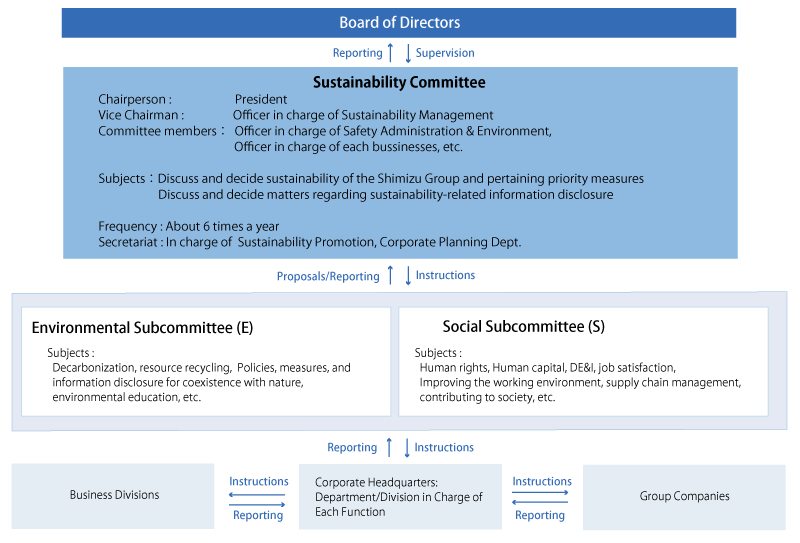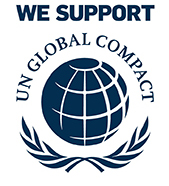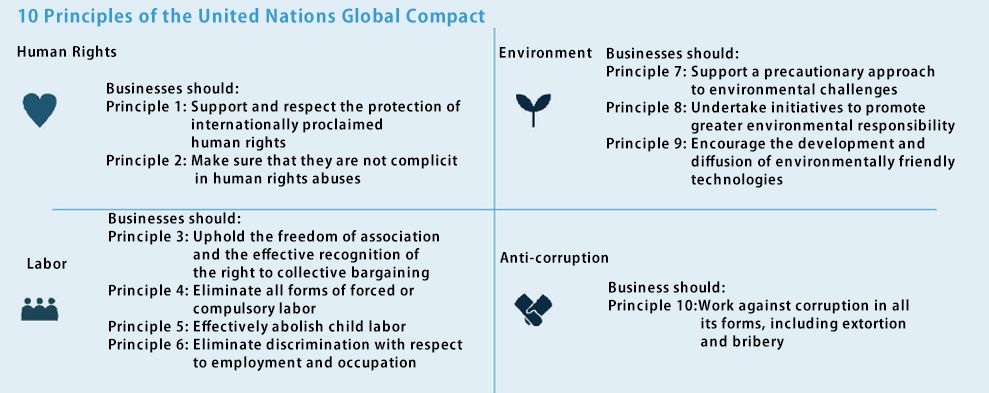Shimizu established the management principles of “With devotion and a spirit of innovation, we work to create value that exceeds expectations and contribute to a sustainable tomorrow” based on the philosophy contained in The Analects and the Abacus, our corporate credo. We engage in business activities, not only for our company, but also with a strong awareness of the sustainability of society and the environment.
In the previous Mid-Term Business Plan (2019-2023), our basic policy was centered on ESG management and fulfilling social responsibility through business activities. However, the current Mid-Term Business Plan (2024-2026) represents a significant evolution. In our commitment to the sustainability of the earth and society, we are enhancing collaboration across various functions within the Group to strengthen our management foundation. This evolution embodies our approach to sustainability management, which balances corporate social responsibility with the pursuit of business opportunities.

Sustainability Management (Mid-Term Business Plan〈2024-2026〉 Strengthening the Management Foundation)
E (Environment): Achieve goals set in SHIMZ Beyond Zero 2050, our group environmental vision
- Promoting fossilization in Scope 1 + 2, and reducing CO2 emissions throughout the facility life cycle, from material manufacturing to operation
- Initiatives aimed at shifting from waste recycling to “resourcing,” starting from the construction site and design
- Promoting Green Infrastructure PLUS to achieve “Nature Positive” by 2030
- Improving the Shimizu Group’s environmental brand through proactive information disclosure (including TCFD and TNFD)
S (Society): Respect of human rights through providing solutions to social issues
- Strengthening the system for utilizing customer and end-user feedback to create new value
- Creating a workplace that attracts a diverse range of talent and leads to a sense of purpose and happiness for all
- Improving working environments and increasing attractiveness to achieve a sustainable construction industry
- Emhancing the Shimizu Group’s credibility through respect for human rights and CSR procurement throughout the supply chain
G (Governance): Take risks while properly risk-hedging Focused dialogue with stakeholders and reflect results in corporate management
- Fostering a business mindset rooted in a strong sense of ethics based on the corporate credo, The Analects and the Abacus (Ethics and Economics)
- Ensuring thorough management of risk hedging and risk-taking based on accurate situational assessments and rules
- Incorporating feedback obtained from stakeholder dialogue into the management strategy formulation process
Sustainability Promotion Structure
At Shimizu, we have established a Sustainability Committee, chaired by the President, to deliberate and decide on the Group’s sustainability policies, key measures, and disclosure of sustainability-related information. Under our governance structure, matters of particular importance are reported to and monitored by the Board of Directors.
We have established a system are repored to the Board of Directors for supervision.
We have also established the Environmental Subcommittee and the Social Subcommittee as an infrastructure of the Sustainability Committee. These subcommittees examine relevant sustainability-related topics and submit their findings to the committee for discussion and decision-making. Additionally, a system is in place to provide instructions to, and receive reports from, related functional departments and divisions in relation to the committee’s deliberations and decisions.
Sustainability Promotion Structure

Participation in the United Nations Global Compact
Shimizu became a member of the United Nations Global Compact in March 2013.
Simizu Corporetion is a member of the Global Compact Network Japan and is actively involved in the Environmental Management Subcommittee, SDGs Subcommittee, the Human Rights Education Subcommittee (as Administrative Agent) and the Women's Empowerment Principles (WEPs) Subcommittee.
See the United Nations website for further details.


| Main Requirements | Topics | Activities (Web links) |
|---|---|---|
| Organizational Governance | ― | |
| Human Rights | Due diligence | |
| Critical situation on human rights | ||
| Avoidance of complicity | ||
| Resolving complaints | ||
| Discrimination and the socially vulnerable | ||
| Civil and political rights | ||
| Economic, social, and cultural rights | ||
| Basic labor principles and rights | ||
| Labor Practices | Employment and employment relationships | |
| Labor conditions and social protection | ||
| Social dialog | ||
| Labor safety and health | ||
| Human resource development and training in the workplace | ||
| Environment | Pollution prevention | |
| Use of sustainable resources | ||
| Mitigating and adapting to climate change | ||
| Environmental protection, biodiversity, and restoration of natural habitats | ||
| Fair Business Practices | Anti-corruption |
Corporate Ethical Standards and Compliance with Laws and Regulations |
| Responsible political involvement | ||
| Fair competitio | ||
| Promoting social responsibility in the value chain | ||
| Respect for property rights | ||
| Consumer Issues | Fair marketing; factual, unbiased information and fair contract practices | |
| Protecting consumer health and safety | ||
| Sustainable consumption | ||
| Consumer service, support, and complaint and dispute resolution | ||
| Consumer data protection and privacy | ||
| Access to necessary and indispensable services | ||
| Improving education and awareness | ||
| Community Participation and Development | Community participation | |
| Education and culture | ||
| Job creation and skills development | ||
| Development of and access to technolog | ||
| Wealth and income creation | ||
| Health | ||
| Social investment |



